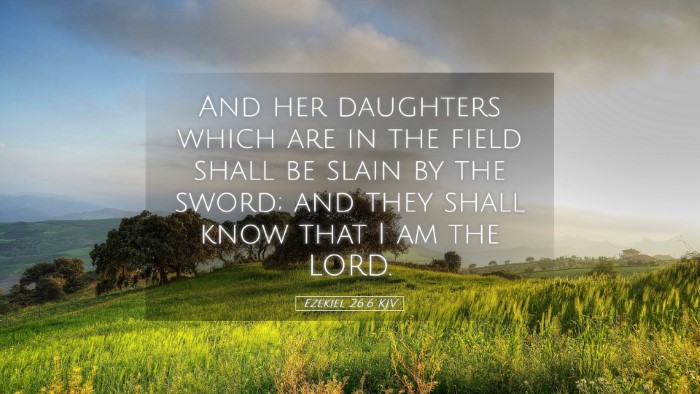Ezekiel 26:6 - Commentary and Insights
Verse Context: Ezekiel 26:6 states, "And her daughters which are in the field shall be slain by the sword; and they shall know that I am the Lord." This verse is part of Ezekiel's prophecy against Tyre, a prominent city known for its trade and wealth.
Historical Background
The city of Tyre was a significant Phoenician city located on the Mediterranean coast. It was known for its commerce and was often characterized by pride and obstinacy against God's people. The prophecy of Ezekiel comes as a divine revelation concerning the fall of Tyre and serves to warn both the city itself and surrounding nations of impending judgement.
Exegetical Insights
Commentary by Matthew Henry: Henry emphasizes the certainty of judgment against Tyre. He highlights that the phrase "her daughters" refers to the smaller towns or cities that rely on Tyre for sustenance. They too would face destruction, reflecting the far-reaching consequences of Tyre's sinfulness.
Albert Barnes’ Perspective: Barnes notes that the phrase "they shall know that I am the Lord" is pivotal. It implies that the devastation of Tyre and her daughters is intended to reveal God’s sovereignty and authority over nations. This emphasizes God's purpose not just in judgment, but in asserting His rightful place as the supreme ruler.
Insights from Adam Clarke: Clarke interprets this verse as a manifestation of God’s design to chastise not only Tyre but all nations that have been in league with her. Clarke highlights the moral lesson that those who disregard the divine order can expect inevitable consequences.
Theological Implications
This verse presents crucial theological themes, including divine justice, sovereignty, and the consequences of pride. The destruction of Tyre serves as a reminder that God will ultimately hold nations accountable for their actions and that human pride may lead to dire consequences.
Divine Sovereignty
The assurance that “they shall know that I am the Lord” underscores God's desire for recognition of His authority. Throughout scripture, God seeks to demonstrate His power, not just within Israel, but over the entire world. This quest for recognition speaks to the universal reach of God’s dominion.
Consequences of Pride
The commentary elucidates a pattern of pride leading to downfall. Tyre’s wealth fostered a sense of invincibility, ultimately leading to their demise. This serves as a warning to modern readers about the dangers of spiritual pride and reliance on material wealth.
Practical Applications
- Awareness of Consequences: Believers are encouraged to consider the impact of their actions, both individually and collectively. Just as Tyre faced destruction for its sins, congregations today must remain vigilant against moral decay.
- Recognition of God’s Sovereignty: Emphasizing the importance of acknowledging God's rule can lead to personal humility and a more profound worship experience within church communities.
- Call to Action: This passage serves as a call to evangelism and repentance, reminding readers that God's power and justice are facts that must be shared with others.
Conclusion
Ezekiel 26:6 carries profound implications that extend beyond its immediate historical context. By reflecting on the judgments pronounced against Tyre and its daughters, modern readers, including pastors, students, and theologians, are reminded of the steadfastness of God’s justice, the necessity to recognize divine authority, and the enduring consequences of pride. Through this commentary, the importance of heeding biblical warnings and embracing a posture of humility before God becomes evident.


